Racism

An analysis by the 2016 American National Election Study has revealed that racism played a bigger part in Trump’s election than authoritarianism, reports the Washington Post.
The 2016 American National Election Study consisted of about 1,200 people from across the U.S. answering survey questions for more than an hour, the questions structured to reveal their political leanings.
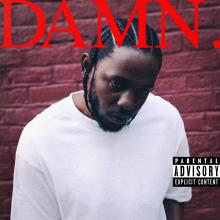
For what the singer/songwriter/music producer Pharrell said two years ago about Kendrick Lamar is absolutely true. Kendrick Lamar is the Bob Dylan of his generation, an American storyteller on the same plane as Toni Morrison, Eugene O’Neill, Pearl S. Buck, and other U.S. Nobel Prize in Literature laureates. Why this statement may seem overblown is because of highbrow bias against hip-hop, which is to say bias against black language, black storytellers, black people. But, to quote Chuck D, the leader of the rap group Public Enemy, hip-hop is “CNN for black people.” And Lamar is the best reporter in the business.

But more deeply than that, framing Terence’s last gasp of life in the texture of local challenges shows the frailty of black Tulsa’s dream of equal treatment. We need to ensure Terence does not become another note on a scale of the pain felt by countless black and brown lives. It’s only been seven months and the voices of those affected by this history have been diminished.
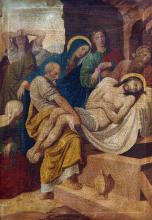
In the midst of so much death, how can we Christians celebrate Easter?
These questions can be paired with questions regarding our own sense of worship on that day. How much have we Christians replaced justice with worship, not taking one into serious relation with the other? Are we accustomed to worship in the total absence of justice?

We can hope, work, and pray for the day when Christians of all colors might be reconciled to one another in peace. In the meantime, Get Out reminds us that white people, especially those who claim to love us, must do better.

“Language matters. The use of the term ‘honour’ to describe a violent criminal act … can be explained only as a means of self-justification for the perpetrator. It diminishes the victim and provides a convenient excuse for what in our society we should accurately and simply call murder, rape, abuse, or enslavement,” Ghani said when introducing her crime-against-women bill Jan. 31.
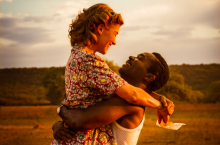
Like Hidden Figures before it, the post-World War II historical drama A United Kingdom is a great and worthy story, told poorly. The real-life account of the marriage between Londoner Ruth Williams (Rosamund Pike) and Seretse Khama (David Oyelowo), the ruler of Beuchanaland (now Botswana), is an incredible story about an interracial relationship with world-changing political implications. Unfortunately, the film does its subjects little credit, suffering from directing and writing choices that keep it from achieving its potential.
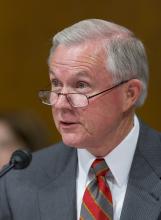
Attorney General Jeff Sessions recused himself from investigations surrounding Russian involvement in the presidential election "to the extent they exist," in an impromptu news conference March 2. The move comes after the Washington Post broke news the night before that he twice spoke with Russia's ambassador last year and that he did not disclose the conversations when pressed during his Senate confirmation hearing.
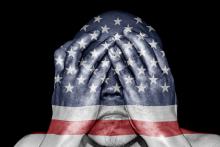
The history of America is the story of the great struggle between the dream of equality and the nightmare of how equality is defined. All men are created equal, but not poor men, or men of color, or women. Send me the “wretched refuse of your teeming shore. Send these, the homeless, tempest-tost to me” … but not if they are Irish, French, German, Chinese, Japanese, Mexican, or Muslim.
The call of the prophet is to call one’s nation to repentance, to courageously expose the hypocrisies and contradictions between dreams and reality. America has to be awoken from the stupor of false dreams.
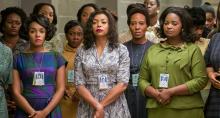
“Here at NASA, we all pee the same color,” says Harrison.
But this scene never happened. Harrison never took a crowbar to a “Colored Ladies Room” sign. He never solved Johnson’s dilemma of having limited accessibility to a legal bathroom. Harrison’s action is a fabrication framed as history, one that could easily be recognized as an insidious white savior narrative created and advanced by the white people who made the film.
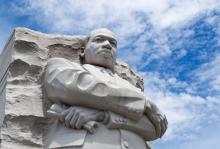
On the Friday morning before Martin Luther King Day this year I met nine twentysomething Sojourners interns at the Martin Luther King Jr. Memorial on the National Mall. We collected into a circle, and I told them: “This is sacred ground.” I explained that we would enter the grounds in silence. I instructed the mostly white group to spend 15 minutes examining the memorial — observe — see what they see. Then we would come back together and share what we saw.

Since the election of President Donald Trump, many Christians are asking: How could so many Christ-followers agree with actions that are so decisively un-Christlike? Many Christians are struggling to understand how two things that are diametrically opposed to one another — Trump’s policies versus following the gospel of Christ — can be possibly reconciled.
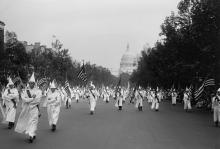
The only answer to the racial divide among Christians — evangelicals in particular — is to go much deeper into what racial equity and healing will require. America’s Original Sin was written for such a time as this. It is a book written to and for white Christians and white churches — to help lead them to new conversations with black and brown Christians and their churches. It could be that studying racism in congregation after congregation, and especially between congregations across racial lines, could be a fundamental building block for genuine racial reconciliation in America.

The reporter asked President Trump about the rise of anti-Semitism in America. His answer — or seeming lack of one — angered many prominent Jewish Americans.
“Donald Trump’s inability to simply condemn antisemitism boggles the mind,” said Stosh Cotler, CEO of Bend the Arc Jewish Action.

More than 800 congregations have declared themselves sanctuaries for undocumented immigrants, about double the number since Election Day.
Leaders of the sanctuary movement say the pace of churches, and other houses of worship, declaring themselves sanctuaries has quickened, in the days leading up to the inauguration of President-elect Donald Trump on Jan. 20.

Some of the boys involved in carrying out those acts in December we know, and we know their parents. The parents we do know are not frothing-at-the-mouth bigots. We can’t imagine their sons learned racist ideas at home.
But they learned them somewhere.
Racists and bullies aren’t born. They are made.
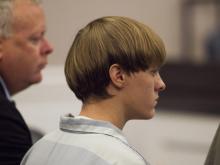
Around them, the air cracked with gunfire, Sanders told a jury on Dec. 7.
“There was so many shots,” Sanders testified in the federal government’s case against Dylann Roof, on trial for killing nine congregants at Emanuel African Methodist Episcopal Church in June 2015. “There was so many shots.”

If I’ve learned anything since my time in Rome, it’s that people — not just Catholics — are hungering to connect peace with justice. This is why those of us who traveled to Rome just before the election, accompanied by Stockton, Calif., Bishop Stephen Blaire, and Houma-Thibodaux, La., Bishop Shelton Fabre, are preparing for a regional WMPM meeting in Modesto, Calif., in February.
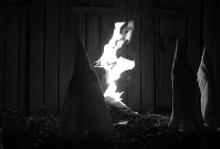
Like many people in the nation, I was deeply disturbed when I stayed up late watching the election results on Nov. 8. This country elected Donald Trump to succeed the nation’s first African-American president — a deed that was in no way coincidental. President Obama’s election was an historic moment: the United States sent a black family to live in the house that slaves built as a residence for the highest political office in the land of their captivity. And with the election of Obama to that high office, the White House became home to free ancestors of the slaves who built it. Obama’s election felt like an earthquake of sorts. When the dust settled, it seemed that some old, terrible things had been demolished, and other things were moved around. From all appearances society had been recalibrated.

We know you are fearful. We know you are still feeling the loss — the loss of a hoped for America that valued diversity, or perhaps the loss of your faith community whose white majority voted for an embodiment of our worst natures.
But we also know that you are ready to resist. You are ready to join the millions who will repeat daily that this ugly rhetoric and dangerous policy proposals cannot become normalized. Racism should not continue as normal, misogyny can’t remain normal, and threatening the well being of those God calls us to welcome cannot become normal.
And so we make this commitment to you: We at Sojourners are all in for whatever is required over the next four years and beyond, as a publication, as a resource, as a community, as a network of activists. Here’s how we get started.